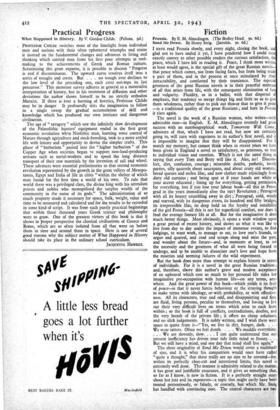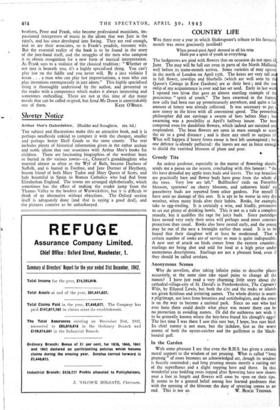Fiction
Frossia. By E. M. Almedingen. (The Bodley Head. 9s. 6d.) Send Me Down. By Henry Steig. (Jarrolds. 9s. 6c1.)
I HAVE read Frossia slowly, and every night, closing the book, and glad not to have ended it yet, I have pondered how I could inn exactly convey to other possible readers the curious satisfaction, th peace, which I have felt in reading it. Peace, I think most writers at least would agree, is the special gift of the great Russian novels—. that peace which comes, not from facing facts, but from being made a part of them, and in the process at once stimulated by their intractability, and comforted by their transience. The especial greatness of the great Russian novels is in their peaceful embrace of all that arises from life, with the consequent elimination of fuss and vulgarity. Fluidity, as in a ballet, with that dispersal of emphasis, that tendency to merge things big and little so as to give them wholeness, rather than to pick out this-or that to give it point —is a traditional quality of the great Russians ; and here in Frossia it rises again.
The novel is the work of a Russian woman, who writes—with admirable ease—in English. E. M. Almedingen recently had great success with an autobiographical work, Tomorrow Will Come; admirers of that, which I have not read, but now am certainly going to, will turn with eagerness to its author's first novel, and it is impossible to imagine that they will be disappointed. For I search my memory, but cannot think when in recent years we have been given in England a novel so satisfactory, so generous, so true to individual vision and emotion. Which is not the same thing as saying that every Tom and Betty will like it. Alas, no! l3iscom- fort, dirt, confusion, courage ; miserable deaths, pathetic, lovely parties, silly quarrels about saucepans, and about crazy old women; bread queues and stolen lilac, and new clothes made rejoicingly from dirty old curtains ; and being spat at if your hands are white or your accent educated ; lining up for everything, getting permission for everything, lost if you lose your labour book—all this in Petro- grad in the years immediately after the 1917 Revolution ; Petrograd with all its beauty crumbling away in dirt ; Petrograd, cold, windy and starved, with its dangerous rivers, its hundred and fifty bridges, its irrepressible lilac, its deep hold on the loyalty and sensibility of the girl Frossia—all this is not for superficial comfort, nor does it feed the average fantasy life at all. But for the imaginative it does much better things. Most obviously, it opens a wide window upon a great period of recent history, and shows us what it was like to live from day to day under the impact of immense events, to find lodgings, to want work, to manage to eat, to love one's friends, to argue and quarrel, and read and scrape along and miss the past, and wonder about the future—and, in moments at least, to see the necessity and the greatness of what all were being forced to undergo, and tp be unable to dissociate one's love and hope from the miseries and seeming failures of the wild experiment.
But the book does more than attempt to explain history in terms of individuals. For it is a novel in the great Russian tradition ; and, therefore, above this author's grave and modest acceptance of an upheaval which cost so much to her personal life rides her imaginative pre-occupation with human life—on any terms, any- where. And the great power of this book—which yields it its fruit of peace—is that it never forces behaviour or the straying thought to make terms with ideology, or with probability, or with effective- ness. All its characters, true and odd, and disappointing and fine, are fluid, living persons, peculiar to themselves, and having to live out their very difficult lives on terms which arise to each from within ; so the book is full Of conflicts, contradictions, doubts, and the very breath of the private life ; it offers no cheap solutions, and no slick judgements. It is nobly written, and I wish there were space to quote from it—" Yes, we live in dirt, hunger, dark. . We wear tatters. Often we feel dumb. . . . We muddle everything. . . . We are slovenly, slow. . . . I can quite understand that our present inefficiency has driven your tidy little mind to frenzy. . . . But we still have a mind, and one day that mind shall live again."
The sheer originality of Send Me Down would cover a multitude of sins, and it is what his compatriots would once have called "quite a thought," that there really are no sins to be covered—for, within its perfectly clear-cut and intentional limits, this novel is extremely well done. The manner is admirably related to the matter, it has great and justifiable assurance, and it gives us something that, so far as I know, is new in fiction. It is a perfectly straight story about hot jazz and its exponents—a topic that might easily have been treated pretentiously, or falsely, or coarsely, but which Mr. Steig has handled with convincing ease. The central characters are twc brothers, Peter and Frank, who become professional musicians, im- passioned interpreters of music in the idiom that was Jazz in the 1920's, and has since developed into Swing. They are real enough, and so are their associates, so is Frank's prudish, tiresome wife. But the essential reality of the book is to be found in the story of the jazz-band itself, and the struggles of the men who compose it to obtain recognition for a new form of musical interpretation. As Prank says to a violinist of the classical tradition: " Whether or not jazz is beneath you, it's a highly specialised thing. You can't play hot on the fiddle and you never will. By a jazz violinist I mean . . . a man who can play hot improvisations, a man who can play inventions extemporarily in jazz idiom." This highly specialised thing is thoroughly understood by the author, and presented to the reader with a competence which makes it always interesting and sometimes enthralling. There are not at this time of day many novels that can be called original, but Send Me Down is unmistakably























 Previous page
Previous page